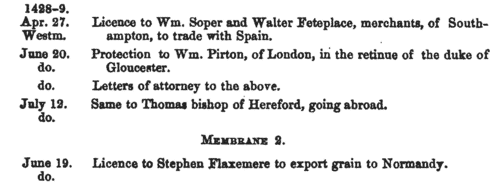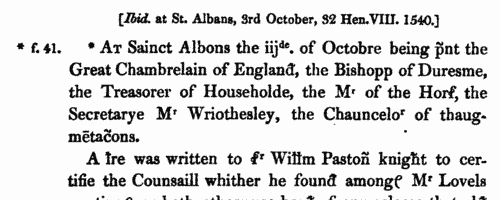Chamberlayne Surname Ancestry ResultsOur indexes 1000-1999 include entries for the spelling 'chamberlayne'. In the period you have requested, we have the following 258 records (displaying 1 to 10): Single Surname Subscription | | | Buying all 258 results of this search individually would cost £1,320.00. But you can have free access to all 258 records for a year, to view, to save and print, for £100. Save £1,220.00. More... |
These sample scans are from the original record. You will get scans of the full pages or articles where the surname you searched for has been found. Your web browser may prevent the sample windows from opening; in this case please change your browser settings to allow pop-up windows from this site. Clergy, the religious and the faithful in Britain and Ireland
(1342-1362)
These are abstracts of the entries relating to Great Britain and Ireland from the Regesta of popes Clement VI and Innocent VI, from the period when the papal court was resident at Avignon. Many of these entries relate to clerical appointments and disputes, but there are also indults to devout laymen and women for portable altars, remission of sins, &c. This source is particularly valuable for Ireland, for which many of the key government records of this period are lost. Clement VI was consecrated and crowned 19 May 1342 (the day from which his pontificate is dated); Innocent VI was crowned 18 December 1352 and died 12 September 1362. The extracts were made by W. H. Bliss and C. Johnson from Regesta cxxxvii to ccxliv, and published in 1897. The registers are almost complete for these two pontificates. At his accession, Clement VI promised to grant benefices to all poor clerks who should come to Avignon and claim them within two months of his coronation. As many as 100,000 are said to have come, and the register for the first year of his pontificate runs to twelve volumes.CHAMBERLAYNE. Cost: £4.00.  | Sample scan, click to enlarge

| Inhabitants of Yorkshire: Harthill wapentake
(1380)
The poll tax returns for this wapentake, the area around Market Weighton, Pocklington and South Cave.CHAMBERLAYNE. Cost: £6.00.  | Sample scan, click to enlarge

| The English in France
(1436)
King Henry VI of England (one of the grandsons of Charles VI of France) claimed the throne of France (and quartered the fleurs-de-lis of France with the lions of England on the royal standard) as had his predecessors since Edward III, as descendants of Philip IV of France. The English had real power or influence in Brittany, Normandy, Flanders and Gascony, and actual possession of several coastal garrisons, in particular Calais, where the French inhabitants had been replaced by English. Henry VI came to the throne only seven years after his father had trounced the French at Agincourt; but his cousin, Charles VII, who became king of France in the same year, spent his long reign rebutting the English king's claim to his throne by territorial reconquest and consolidation. The English administration kept a series of records called the French Rolls. On these are recorded royal appointments and commissions in France; letters of protection and safe-conduct to soldiers, merchants, diplomats and pilgrims travelling to France from England and returning, and to foreign legations. There are also licences to merchants to export to the Continent, and to captains to transport pilgrims. As Henry VI's reign progressed, and the English grip on northern France loosened, the French Rolls also increasingly include entries concerning the ransoming of English prisoners.CHAMBERLAYNE. Cost: £6.00.  | Sample scan, click to enlarge

| Yorkshire Testators and Legatees
(1484-1508)
Wills and testaments from the diocese of York (Yorkshire, Nottinghamshire, Hexhamshire, Lancashire north of the Ribble, and southwest Westmorland) registered at York. Richmond and Southwell archdeaconries had their own lower probate jurisdictions, so the wills registered at York are predominantly from the East and West Ridings and the eastern part of the North Riding of Yorkshire. In theory, wills dealt with real property and testaments with personal property, but the distinction hardly applies in practice: most of these wills are in Latin, but some are in English. Being before the Reformation, they commonly start with benefactions to churches, chantries, chapels, &c., and with provisions for the burning of candles ('lights') and saying of masses. This publication in 1869 by the Surtees Society as Testamenta Eboracensia iv is an edition by James Raine of selected wills from the period. Some additional material is included from the Prerogative Court of Canterbury and the York Dean and Chapter archives.CHAMBERLAYNE. Cost: £4.00.  | Sample scan, click to enlarge

| Taxpayers in Sussex
(1524-1525)
By Act of Parliament of 1523 (14 & 15 Hen. III, c. 16) a general subsidy was raised, spread over four years, from laymen, clergy and peers. In each of the first two years 1s in the £ was raised from annual income from land; 1s in the £ on capital goods worth over £2 and under £20; and a flat payment of 4d on goods worth from £1 to £2, and also by persons aged 16 and upwards in receipt of £1 per annum in wages. In the third year a further shilling in the pound was payable on land worth £50 and upwards a year; and in the fourth year a shilling in the pound on goods worth £50 and upwards. To raise this revenue, returns were required from every hundred, parish or township. In Sussex, the returns for 1524 and 1525 cover the city of Chichester (divided into Estrata, Westrata, Southstrata, North[strata] and Palenta), the borough of Midhurst, and then the rest of the county divided into rapes, within those into hundreds, and within those into boroughs, tithings, liberties, townships or parishes. It is important to note that the cinque ports of Hastings, Rye and Winchelsea were exempt from the subsidy, except for alien inhabitants; and that the town of Westbourne was also exempted 'as the town was lately destroyed by fire'. Aliens are noted as such, sometimes with nationality; and Brighthelmstone (Brighton), which had been burnt by the French in 1514, is only represented fragmentarily. The Sussex Record Society published this transcript and edition by Julian Cornwall of the 1524 and 1525 returns: the 1524 return was used for the main transcript where possible, names peculiar to the 1524 lists being marked with an asterisk, and those with amendments in 1524 with a dagger. At the foot of each 1524 return the new names from 1525 are given. Only the amount of the assessment is printed (m. = marks). Letters prefixed to the sum give the basis of the assessment, no letter (or G) meaning that it was on goods - A, annual wages; D, annual wages of day-labourers; F, fees or salaries of office; L, lands; P, profits; W, wages; x, no basis stated. CHAMBERLAYNE. Cost: £4.00.  | Sample scan, click to enlarge

| Liegemen and traitors, diplomats and spies
(1540-1542)
The Privy Council of England dealt with many delicate and important matters of state. The surviving records date back as early as the 14th century, but Henry VIII on 10 August 1540, with the advice of the council, ordered that the council should have its own clerk 'to write, entre and registre all such decrees, determinacons, lettres and other such things as he shuld be appoynted to entre in a booke, to remayne alwayes as a leger, aswell for the dischardge of the sayd counsaillours touching such things as they shuld passe from tyme to tyme, as alsoo for a memoriall unto theim of their owne procedings'. The register from that date to 8 April 1542 was transcribed for the Commissioners of the Public Records by sir Harris Nicolas, and published in 1837. Although the council often dealt with petitions from aggrieved subjects, its main function was to oversee internal and external security.CHAMBERLAYNE. Cost: £4.00.  | Sample scan, click to enlarge

| Liegemen and Traitors, Pirates and Spies
(1542-1547)
The Privy Council of Henry VIII was responsible for internal security in England and Wales, and dealt with all manner of special and urgent matters
CHAMBERLAYNE. Cost: £4.00.  | Sample scan, click to enlarge

| Freemen of London
(1540-1550)
The long series of mediaeval registers and books of admission of the freemen of London was destroyed by fire in 1786. Thirty surviving charred leaves were gathered together and rebound, becoming Egerton MS 2408 in the British Museum. The order is jumbled and generally speaking none can be dated with certainty, although all belong to the very end of the reign of Henry VIII and the start of the reign of his son, Edward VI. These are pages from the admission books. Each entry here usually gives the name of the person admitted to the freedom; his father's name, address and occupation; his entitlement to the freedom, usually by having served out an apprenticeship to a citizen, naming the master and his trade. Then there may follow a cross-reference to M. or N., being two volumes of another set of official books denoted by the letters of the alphabet, and following each other in chronological sequence, which evidently gave details of entries into apprenticeships. These other books no longer exist: but the dates given for entry do identify the start of the apprenticeship, and so give by implication a date for the eventual admission to freedom. In the margin is the name of the city ward and the total of the fee and fine paid on admission.CHAMBERLAYNE. Cost: £4.00.  | Sample scan, click to enlarge

| Liegemen and Traitors, Pirates and Spies
(1550-1552)
The Privy Council of Edward VI was responsible for internal security in England and Wales, and dealt with all manner of special and urgent matters
CHAMBERLAYNE. Cost: £4.00.  | Sample scan, click to enlarge

| Liegemen and Traitors, Pirates and Spies
(1552-1554)
The Privy Council of Edward VI and queen Mary was responsible for internal security in England and Wales, and dealt with all manner of special and urgent matters
CHAMBERLAYNE. Cost: £4.00.  | Sample scan, click to enlarge

|
Research your ancestry, family history, genealogy and one-name study by direct access to original records and archives indexed by surname.
|












